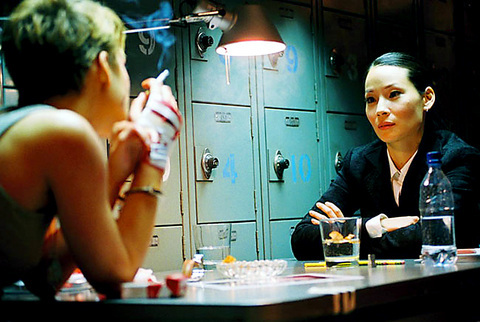However annoying it can be to hear a native Brit saying "ass" instead of "arse" -- or even having a go at "butt" -- there are times when only the American word sounds right. Here to prove that is Keira Knightley, who has swapped her Jane Austen bonnets for some transfer tattoos, playing Domino Harvey, daughter of movie idol Laurence Harvey. She was a privileged English girl who in real life became an LA bounty hunter and an all-round sexy badass -- or rather bad-arse.
Bounty hunting is a dangerous vocation; so why should Domino choose it, you ask? Sounding like a falsetto Dan Maskell, Knightley chirrups: "So I could kick arse and not do time." Kick arse? I don't think I have ever heard the word pronounced with a longer vowel. That is possibly how the real Domino spoke, yet Knightley's tough act is about as convincing as Boris Johnson doing a live medley of 50 Cent covers.
Director Tony Scott's macho-sentimental tribute to Harvey neglects to mention her real-life drug problem, which contributed to her death in June this year after the movie was complete -- discovered dead in her apartment due to a painkiller overdose, while awaiting trial for dealing narcotics. The omission of drugs is therefore all the more glaring and embarrassing, and Scott simply slaps an unexplained tribute on the closing credits, dedicating his film to her "memory." But what precisely is being remembered? And why? It's not a straight biopic but apparently a selective, fictionalized account of events which are of limited interest in the first place. The result is a chaotic, violent and baffling action thriller without shape or perspective, in which every frame has been cranked up with flashy editing and boiling cinematography.

After the traumatic death of her goldfish -- and the emotional scar tissue is simply piling up -- Domino grows up to be a fierce babe with attitude and that exotic first name is a token of how supercool she is. I can only say that Tony Scott here missed a massive opportunity for comedy. Would it have killed him to include a scene where she trips over and bumps into someone, causing them to topple over, hitting someone else, and they topple over, and so on?
Transplanted to America by her ambitious mother after Laurence dies, Domino gets kicked out of school and answers an ad for bounty hunters in a discarded paper -- the US edition of The Lady, perhaps? She hooks up with two bounty-hunting hombres, Mickey Rourke and Edgar Ramirez, controlled by the unscrupulous Delroy Lindo. But things get terrifyingly out of control when Lindo involves them in a plan to heist US$10m.
The most excruciating moment comes when Domino gets out of a tight situation with a Latino gang by offering to give their leader a lapdance. "Bra and panties on," she specifies primly -- a proviso which the gangstas accept with remarkable gallantry. Later on, Domino's gang will mutilate someone because Lindo gives her instructions to "take off his shirt so you can see his arm" over a crackling mobile phone. It comes out as "take off ... his arm" and they duly hack off the poor fellow's arm! D'oh! D'oh squared! D'oh tripled with knobs on! In this macabre situation, Tony Scott finds neither horror nor Tarantinoesque black comedy. It is just part of the featureless splurge of violence.

So is this new tough routine one for Knightley's showreel? An answer is provided in the scene where teenage Domino insists on practising her martial arts moves by the family pool. Her posh mum, played by Jacqueline Bisset, drawls from her lounger in a Kensington accent: "Give the goddamn nunchucks a rest, already." You heard your mother. Do give the nunchucks a rest.

May 26 to June 1 When the Qing Dynasty first took control over many parts of Taiwan in 1684, it roughly continued the Kingdom of Tungning’s administrative borders (see below), setting up one prefecture and three counties. The actual area of control covered today’s Chiayi, Tainan and Kaohsiung. The administrative center was in Taiwan Prefecture, in today’s Tainan. But as Han settlement expanded and due to rebellions and other international incidents, the administrative units became more complex. By the time Taiwan became a province of the Qing in 1887, there were three prefectures, eleven counties, three subprefectures and one directly-administered prefecture, with

Taiwan Power Co (Taipower, 台電) and the New Taipei City Government in May last year agreed to allow the activation of a spent fuel storage facility for the Jinshan Nuclear Power Plant in Shihmen District (石門). The deal ended eleven years of legal wrangling. According to the Taipower announcement, the city government engaged in repeated delays, failing to approve water and soil conservation plans. Taipower said at the time that plans for another dry storage facility for the Guosheng Nuclear Power Plant in New Taipei City’s Wanli District (萬里) remained stuck in legal limbo. Later that year an agreement was reached

What does the Taiwan People’s Party (TPP) in the Huang Kuo-chang (黃國昌) era stand for? What sets it apart from their allies, the Chinese Nationalist Party (KMT)? With some shifts in tone and emphasis, the KMT’s stances have not changed significantly since the late 2000s and the era of former president Ma Ying-jeou (馬英九). The Democratic Progressive Party’s (DPP) current platform formed in the mid-2010s under the guidance of Tsai Ing-wen (蔡英文), and current President William Lai (賴清德) campaigned on continuity. Though their ideological stances may be a bit stale, they have the advantage of being broadly understood by the voters.

In a high-rise office building in Taipei’s government district, the primary agency for maintaining links to Thailand’s 108 Yunnan villages — which are home to a population of around 200,000 descendants of the Chinese Nationalist Party (KMT) armies stranded in Thailand following the Chinese Civil War — is the Overseas Community Affairs Council (OCAC). Established in China in 1926, the OCAC was born of a mandate to support Chinese education, culture and economic development in far flung Chinese diaspora communities, which, especially in southeast Asia, had underwritten the military insurgencies against the Qing Dynasty that led to the founding of